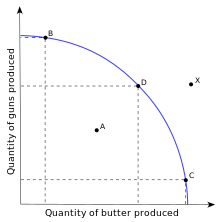 An efficient economy operates at the the production-possibility frontier, the trade-off between producing different combinations of various commodities. Any point on the frontier (the blue line in the graph to the right, e.g. points B, C and D) represents efficient aggregate production: we could not produce more of one commodity without sacrificing production of another. Any point "outside" the frontier (e.g. point X) is impossible to achieve given the current means of production. Any point "inside" the frontier (e.g. point A) represents real inefficiency: we could produce more of one commodity without sacrificing any production of the other.
An efficient economy operates at the the production-possibility frontier, the trade-off between producing different combinations of various commodities. Any point on the frontier (the blue line in the graph to the right, e.g. points B, C and D) represents efficient aggregate production: we could not produce more of one commodity without sacrificing production of another. Any point "outside" the frontier (e.g. point X) is impossible to achieve given the current means of production. Any point "inside" the frontier (e.g. point A) represents real inefficiency: we could produce more of one commodity without sacrificing any production of the other.The production-possibility frontier has direct implications on prices. The relative prices of the commodities when production is on the frontier should have some definite relationship to bind them to the line, but prices inside the frontier will not have that same relationship, since they are set inside an area, not on a line, giving them another degree of freedom.
Suppose, for example, we impose a "tax" on butter, and this tax is simply wasted. For every nine workers a butter manufacturer hires, he must hire another worker at the same wage to sit around watching TV and surfing the net. This "tax" then reduces whatever level of butter production we might achieve without achieving a corresponding increase in the number of guns produced. Since we could (by not paying 10% of our butter production workforce to sit around doing nothing) produce more guns without producing less butter, we must therefore be inside the production-possibility frontier, and our economy is not efficient.
The relative prices of guns and butter, however, will have some definite relationship that takes into account this wasted tax on butter. Having this relationship, however, based on inefficient production means that any relationship with the assumption of efficient production will not hold.
My speculation is that the requirement that capital receive a constant rate of return by itself introduces real economic inefficiency. Furthermore, because a capitalist economy typically measures total rate of return on capital, but the real rate of return is a rate on variable capital (the surplus value of the workers), the economic inefficiency is not just variable across industries with different organic compositions of capital, but it's also opaque.
To sum up: At the production-possibility frontier, the labor theory of value should more-or-less obviously hold. The requirement of a constant rate of return on total capital places us inside the production-possibility frontier. The inefficiencies introduced by the constant rate of return will vary according to the organic composition of capital. We could solve the transformation problem only by measuring the individual organic compositions; since these values are opaque, the transformation problem is unsolvable. Observing that the labor theory of value does not more-or-less obviously hold (and the transformation problem is unsolvable) is direct evidence that the economy is not efficient.
Is it true? I dunno. Ask me in a few years when this is my PhD thesis topic.
No comments:
Post a Comment
Please pick a handle or moniker for your comment. It's much easier to address someone by a name or pseudonym than simply "hey you". I have the option of requiring a "hard" identity, but I don't want to turn that on... yet.
With few exceptions, I will not respond or reply to anonymous comments, and I may delete them. I keep a copy of all comments; if you want the text of your comment to repost with something vaguely resembling an identity, email me.
No spam, pr0n, commercial advertising, insanity, lies, repetition or off-topic comments. Creationists, Global Warming deniers, anti-vaxers, Randians, and Libertarians are automatically presumed to be idiots; Christians and Muslims might get the benefit of the doubt, if I'm in a good mood.
See the Debate Flowchart for some basic rules.
Sourced factual corrections are always published and acknowledged.
I will respond or not respond to comments as the mood takes me. See my latest comment policy for details. I am not a pseudonomous-American: my real name is Larry.
Comments may be moderated from time to time. When I do moderate comments, anonymous comments are far more likely to be rejected.
I've already answered some typical comments.
I have jqMath enabled for the blog. If you have a dollar sign (\$) in your comment, put a \\ in front of it: \\\$, unless you want to include a formula in your comment.
Note: Only a member of this blog may post a comment.